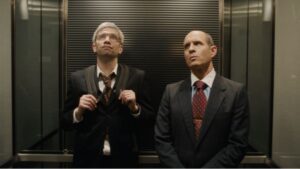August 20, 2023
by Carla Hay

Directed by Matt Johnson
Culture Representation: Taking place in Canada and in the United States, from 1996 to 2013, the comedy/drama film “BlackBerry” features a nearly all-white cast of characters (with a few Asians) representing the working-class, middle-class and wealthy.
Culture Clash: Canada-based technology company BlackBerry becomes a global success as the maker of the world’s first smartphone, but internal power struggles, bad management and an inability to compete with Apple’s iPhone all lead to BlackBerry’s downfall.
Culture Audience: “BlackBerry” will appeal primarily to viewers who are interested in watching scripted movies that depict behind-the-scenes business dealings of real-life famous companies.

“BlackBerry” takes viewers on a roller coaster ride in telling this “based on a true story” about the rise and fall of BlackBerry, the first popular smartphone. Glenn Howerton gives a standout performance as a greedy corporate villain with a nasty temper. The movie is made with a mockumentary-styled combination of a comedy and drama. “BlackBerry” had its world premiere at the 2023 SXSW Film & TV Festival.
Directed by Matt Johnson (who co-wrote the “BlackBerry” screenplay with Matthew Miller), “BlackBerry” is based on the 2015 non-fiction book “Losing the Signal: The Untold Story Behind the Extraordinary Rise and Spectacular Fall of BlackBerry,” by Jacquie McNish and Sean Silcoff. The movie’s story takes place in chronological order, from 1996 to 2013. BlackBerry manufacturer Research in Motion Ltd., which was founded in 1984, went from being a scrappy start-up company headquartered in Waterloo, Ontario, to being the world’s first and leading company for smartphones.
At its peak in 2008, after Research in Motion became a publicly traded company, its stock price was valued at $147 per share, with an overall estimated company value $85 billion. Research in Motion changed its name to BlackBerry Ltd. in 2013. For the past several years, BlackBerry’s stock price as hovered between $8 to $10 per share. How and why did it all go so wrong?
The “BlackBerry” movie shows that this train wreck didn’t go off the rails right away. Like many tech startups, Research in Motion was founded by eager entrepreneurs with big ideas and a fanatical work ethic but not the best business acumen when it came to sales and managing money. And when you bring in a toxic troublemaker to co-lead the company, it’s a recipe for disaster.
Research in Motion was co-founded by two self-admitted computer nerds named Mike Lazaridis (played by Jay Baruchel) and Douglas “Doug” Fregin (played by “BlackBerry” director Johnson), who (for a while) could have been considered the Canadian versions of Apple Inc. co-founders Steve Jobs and Steve Wozniak. Just like in the Jobs/Wozniak relationship, one person in the partnership was the master of overall concepts and marketing, while the other person was the technical/engineering whiz.
In the case of Research in Motion, Mike was the concept/marketing guy, while Doug was the technical/engineering guy. In the “BlackBerry” movie, Mike is a constant worrier, and he tends to be too gullible in business. Doug has a jolly personality, but he approaches business with more logic and healthy skepticism. Eventually, the different personalities of these two friends will lead to several clashes between them on decisions for Research in Motion.
An early scene in the movie takes place in 1996, when Research in Motion is still a struggling start-up, but Mike and Doug are still the best of friends. Mike tells his all-male team of computer geeks (there are about seven employees on this team) that he had a shop teacher who once told him that anyone who could put a computer inside a phone would change the world. Doug thinks of a prototype that will be like a combination of a pager, a phone and a device that can send and receive email. Mike’s name for this invention is Pocket Link, but the name would eventually be changed to BlackBerry.
As ambitious as this idea is, Mike struggles to find investors for it. Part of the problem is that introverted Mike isn’t very good at sales and marketing presentations. He’s articulate when it comes to tech jargon, but he often has a hard time explaining technical issues to non-tech people. Mike is also not very fond of public speaking.
An early scene in “BlackBerry” shows Mike coming back from a business meeting where he was rejected by a potential investor. The reaction of Doug and the other staffers is to shrug it off and gather to watch “Raiders of the Lost Ark,” which is Mike’s favorite movie. However, Mike is in no mood for this diversion, which he would normally use as a way to cheer himself up.
Meanwhile, at another company, cutthroat sales executive Jim Balsillie (played by Howerton) is feeling very discontented at Sutherland-Schultz Limited, a construction company headquartered in Cambridge, Ontario. Jim wants to run a new division of the company, but his boss Rick Brock (played by Martin Donovan) won’t let it happen. Jim is also upset because he feels that he is being sidelined. It isn’t long before volatile Jim gets fired.
Around the same time, Jim and Mike end up meeting each other. Mike tells Jim about Research in Motion’s new phone invention. Jim doesn’t tell Mike right away that he’s currently unemployed because he’s been fired. Jim thinks this phone will be a massive hit, but Research in Motion needs the money to make and market this phone. Jim offers to be the co-CEO who can bring in these capital funds, but on one condition: Jim wants to own half of Research in Motion.
Doug is vehemently against this business proposal, because Doug and Mike made a deal with each other that they would never sell at least 50% of the company. Eventually, a compromise is reached: Jim will own 33% of the company (which he buys for $125,000) and be co-CEO with Mike. Jim will oversee all the company’s sales and marketing, while Mike will oversee all the day-to-day operations. Jim also takes out personal loans to help keep the business afloat.
Jim’s aggressive style and his sales connections initially benefit Research in Motion. And as many people already know, the BlackBerry phone (which pioneered having a mini-keyboard as part of its interface) was launched in 1999, and was the market leader for nearly 10 years. BlackBerry also had the nickname CrackBerry because of how addictive it was for many people. Apple launched the iPhone in 2007.
In no uncertain terms, the “BlackBerry” movie puts most of the blame on Jim for the downfall of the BlackBerry brand. He’s portrayed as someone who got too greedy and too delusional about his power. Howerton gives a riveting performance that’s a great character study of a tyrant who’s out of control. Anyone who thinks what’s in the movie is exaggerated has no idea that Jim’s heinousness is not only a very accurate portrayal of how many corporate CEOs act but this damaging toxicity can also be a lot worse in real life than what’s shown in the movie.
Mike is portrayed as someone who changes from being an accessible “one of the guys” part of the team to becoming an increasingly cold and distant CEO. Doug repeatedly tries to warn Mike that Jim will run the company into the ground, but Mike is blinded by the spectacular profits that the company is making. Doug eventually makes a decision about how he’s going to handle all of these changes.
The mockumentary style of “BlackBerry” often mimics the sitcom “The Office,” with an occasionally shaky hand-held camera that often zooms in on people’s facial expressions. The characters in the movie sometimes have awkward pauses in their sentences, as if they’re self-conscious about being filmed. However, there is no mockumentary director or other filmmakers who are shown as characters in the movie. It’s a wise choice, because fabricating these types of characters would be an unnecessary distraction.
One of the best things about “BlackBerry” is its sharp and incisive screenplay. The dialogue in the movie is often hilarious to watch, even when the characters are being deadly serious. Perhaps the only noticeable flaw of the movie is that it doesn’t do a very good job of convincing viewers how much Mike ages over the decades portrayed in the film. Putting a fake-looking white wig on Baruchel doesn’t make him look older in the movie. It just makes him look like he’s wearing a white wig.
Despite a few minor flaws, “BlackBerry” maintains an entertaining level throughout the entire film, which shows other corporate sharks swimming in these smartphone business waters. Cary Elwes has an amusing supporting role as Palm CEO Carl Yankowski, who threatens a hostile takeover of BlackBerry, which at the time was the biggest rival to the PalmPilot. (In real life, Yankowski died on May 13, 2023, a day after “BlackBerry” was released in theaters.) Michael Ironside portrays Charles Purdy, a no-nonsense executive who’s brought in as chief operating officer of Research in Motion. Charles immediately starts to “crack the whip,” by forcing employees to have a more formal and corporate culture.
Rich Sommer portrays a fictional character named Paul Stanos, one of the lead design engineers on the BlackBerry team. Sal Rubinek has a pivotal role as John Woodman, a leader of Bell Atlantic. Apple is portrayed as a corporate rival whose principal executives are kept at distance in the story and are not characters in the movie. It’s a reflection of what would eventually be BlackBerry’s undoing: The Research in Motion executives weren’t paying enough attention to what Apple was doing with iPhone upgrades and ended up being crushed by the competition from iPhone products.
There are many movies that serve as cautionary tales of what can happen in business when greed and arrogance take over and lead to bad decisions. “BlackBerry” isn’t interested in doing any preaching. The movie isn’t a complete satire, but it pokes some fun at the Research in Motion executives who thought they were brilliant but ended up ruining a very successful company. Simply put: The comedy in “BlackBerry” is very bittersweet indeed.
IFC Films released “BlackBerry” in select U.S. cinemas on May 12, 2023. The movie was released on digital and VOD on June 2, 2023. “BlackBerry” was released on Blu-ray and DVD on August 15, 2023.


